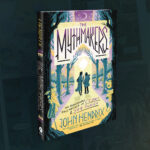I saw Disney’s Christopher Robin in mid-August, late summer here in the United States—the transitional season when the adventurous days of summer, sun, sand, and play give way to the structured rhythms of school. Combined with the fact that Christopher Robin (not to be confused with last year’s Goodbye, Christopher Robin) is largely a nostalgic reverie for the lost innocence of carefree play, it was easy for me to read the film through the lens of summer’s end.
Though the pacing of Christopher Robin drags in places, and the plot beats are somewhat predictable, the film is by and large a sweet, refreshingly sincere family movie. It connected with me not only because I loved A. A. Milne’s Winnie the Pooh stories as a kid, and not only because I’m expecting the birth of my firstborn child in a few weeks, but also because it captures something beautiful and true about the bittersweet losses that come with life’s changing seasons.
Childhood’s Passing
There is a little-known poem by C. S. Lewis called “Late Summer.” It’s a sad poem, full of regret and longing, but it captures poignantly the “summer’s end” feeling of decay, shorter days, and the winding down of possibility:
I, dusty and bedraggled as I am,
Pestered with wasps and weed and making jam,
Blowzy and stale, my welcome long outstayed,
Proved false in every promise that I made,
At my beginning I believed, like you,
Something would come of all my green and blue.
Mortals remember, looking on the thing
I am, that I, even I, was once a spring.
The first 15 minutes of Christopher Robin capture something of this feeling. The film opens on what feels like a midsummer’s garden party in the Hundred Acre Wood. Young Christopher Robin (Orton O’Brien) enjoys a rollicking tea party with the whole gang: Pooh, Tigger, Piglet, Eeyore, Kanga, Roo, and Owl, all of them live-action talking stuffed animals that uncannily resemble their previous iterations on page and screen. There is laughter, cake, and (of course) plenty of honey. But it is also sunset, and the celebration marks Christopher Robin’s departure from his magical fraternity of woodland creatures. He is growing up.
In a montage sequence set to music that appropriately evokes a ticking clock, we see Christopher Robin’s childhood gradually disappear. He goes off to boarding school, where a teacher reprimands him for drawing pictures of Pooh. Soon he is an adult (Ewan McGregor), meeting and marrying his wife (Hayley Atwell), becoming a father to a girl (Bronte Carmichael), going off to war, and working a demanding job as an “efficiency expert” at a London luggage company.
Here the film most effectively uses the means of cinema (the art of “sculpting in time,” according to Andrei Tarkovsky) to capture the passage of time and the joyful longing that comes with aging, forgetting, and watching the brightness of summer fade before your eyes. But rather than lament the end of a carefree summer and the onset of the proverbial autumn, Robin takes stock of life’s passage joyfully and—as the film goes on—ponders whether what is lost is always forever lost.
Value of Unproductive Spaces
Directed by Marc Forster, Christopher Robin feels like a thematic cousin to Forster’s acclaimed Finding Neverland (2004), a film about Peter Pan creator J. M. Barrie that explored similar emotional terrain. Both films highlight the tensions between the protected innocence of childhood and the unavoidable pain of life. Both challenge viewers to value the fanciful, the imaginary, and the spaces of play free from the “efficiencies” of adult life.
Grown-up Christopher Robin is sort of like Mr. Banks in Mary Poppins (a comparison underscored by the 20th century London setting of both stories). He is a career man whose focus on work, order, and efficiency—a word Pooh hears as “a fish in the sea”—lead to a neglected home life and a self-seriousness that devalues play. It takes an unexpected re-connection with his forest friends to show Robin his priorities are confused. What’s the point of working if one can never enjoy the weekend? Is efficiency helpful if it sucks the joy out of family life?
As ever, Pooh is a source of softly, slowly spoken nuggets that speak truth not only to Robin but to all of us who suffer under the tyranny of efficiency in our fast-paced, technological age.
“Doing nothing often leads to the very best something,” Pooh says at one point early in the film. It’s a truism we desperately need to recover in our boredom-averse age, where every spare moment triggers us to grab our phones and scroll away into distracted oblivion. It’s a truism that evangelicals especially need to hear, prone toward pragmatism and relevance-obsessed as we are. Not only is Sabbath rest a biblical value, but it’s also a source of great beauty and nourishment for innovation. As any artist or creator will attest, along with Pooh, it is often the “unproductive” spaces and “irrelevant” explorations that lead to the best things.
Not only is Sabbath rest a biblical value, but it’s also a source of great beauty and nourishment for innovation.
Don’t Outgrow the Hundred Acre Wood
Another poem I thought of as I watched Christopher Robin, and one that always reminds me of late summer, is Dylan Thomas’s “Fern Hill.” A lyrical ode to his youth, Thomas writes of the “lamb white days” when he was “young and easy under the apple boughs,” romping around English hills and forests and farms, “happy as the grass was green.” Here’s one of my favorite stanzas:
And as I was green and carefree, famous among the barns
About the happy yard and singing as the farm was home,
In the sun that is young once only,
Time let me play and be
Golden in the mercy of his means,
And green and golden I was huntsman and herdsman, the calves
Sang to my horn, the foxes on the hills barked clear and cold,
And the sabbath rang slowly
In the pebbles of the holy streams.
“The sabbath rang slowly in the pebbles of the holy streams.” That line captures so beautifully the way nature, God’s wonderland of beauty, can remind us to slow down, to rest “in the mercy of his means,” and to drop the facade of self-sufficiency and urgent productivity that so often dulls our senses and compounds our pride.
For Robin, the Hundred Acre Wood is not an escape from real life. It’s a nourishing, re-calibrating space, a reframing of life through the lens of received grace. Sometimes these are physical spaces, retreats where one can rest and enjoy and simply be. For C. S. Lewis, perhaps it was Shotover Hill or Addison’s Walk in Oxford. Sometimes it is a place that exists mostly in memory. For Dylan Thomas, it was Fernhill in the Welsh countryside.
What are your reminders that efficiency isn’t everything and that unstructured, unhurried time is time well spent? What keeps you sensitized, and longing for, the heavenly home where we finally and perfectly rest?
What is your Hundred Acre Wood? Where do you go to feel “golden in the mercy of his means”? What are your reminders that efficiency isn’t everything and that unstructured, unhurried time is time well spent? What keeps you sensitized, and longing for, the heavenly home where we finally and perfectly rest?
Near the end of Christopher Robin, adult Robin challenges Pooh’s carefree, lackadaisical, smell-the-roses approach to life. Pooh responds with a question that should chasten all of us who are prone to overestimate our own importance and devalue the seemingly superfluous gifts, whether they be red balloons or pots of honey.
“There’s more to life than just balloons and honey!” Robin exclaims.
And Pooh quietly responds: “Are you sure?”
Involved in Women’s Ministry? Add This to Your Discipleship Tool Kit.
 We need one another. Yet we don’t always know how to develop deep relationships to help us grow in the Christian life. Younger believers benefit from the guidance and wisdom of more mature saints as their faith deepens. But too often, potential mentors lack clarity and training on how to engage in discipling those they can influence.
We need one another. Yet we don’t always know how to develop deep relationships to help us grow in the Christian life. Younger believers benefit from the guidance and wisdom of more mature saints as their faith deepens. But too often, potential mentors lack clarity and training on how to engage in discipling those they can influence.
Whether you’re longing to find a spiritual mentor or hoping to serve as a guide for someone else, we have a FREE resource to encourage and equip you. In Growing Together: Taking Mentoring Beyond Small Talk and Prayer Requests, Melissa Kruger, TGC’s vice president of discipleship programming, offers encouraging lessons to guide conversations that promote spiritual growth in both the mentee and mentor.

































